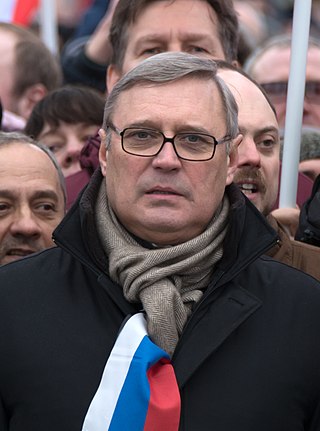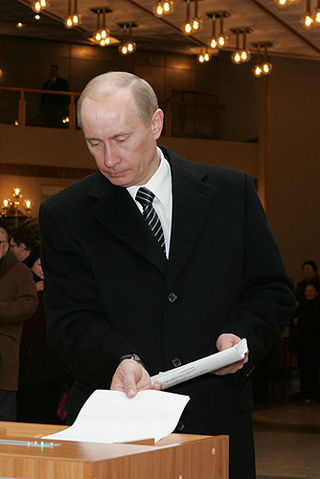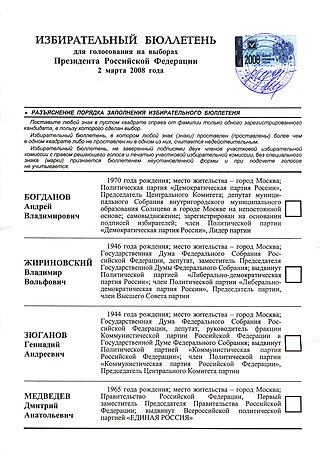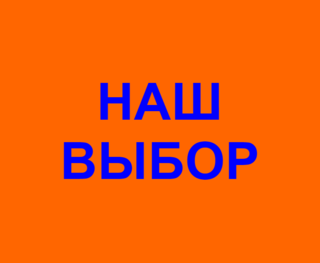Related Research Articles

Mikhail Mikhailovich Kasyanov is a Russian politician who served as Prime Minister of Russia from 2000 to 2004. Previously, he had served as First Deputy Prime Minister in 2000 and Minister of Finance from 1999 to 2000. During the 1990s, he worked in President Boris Yeltsin's administration in different positions before joining President Vladimir Putin's first administration. He has the federal state civilian service rank of 1st class Active State Councillor of the Russian Federation.

Sergey Vladilenovich Kiriyenko is a Russian politician who has served as First Deputy Chief of Staff of the Presidential Administration of Russia since 5 October 2016. He previously served as the 30th Prime Minister of Russia from 23 March to 23 August 1998 under President Boris Yeltsin, and was head of the Rosatom nuclear energy company between 2005 and 2016. Kiriyenko was the youngest Prime Minister of Russia, taking the position at age 35. Ideologically a technocrat, he has played a leading role in the governance of Russian-occupied territories of Ukraine since the Russian invasion of Ukraine.

The Union of Right Forces, was a Russian liberal-conservative political public organization and former party, initially founded as an electoral bloc in 1999 and associated with free market reforms, privatization, and the legacy of the "young reformers" of the 1990s: Anatoly Chubais, Boris Nemtsov, Sergey Kiriyenko and Yegor Gaidar. The party officially self-dissolved in 2008. Nikita Belykh was the party's last leader from 2005 to 2008.

Irina Mutsuovna Khakamada is a Russian economist, political activist, journalist, teacher, publicist, and politician who ran in the 2004 Russian presidential election.
Within Russian political parties, liberal parties advocate the expansion of political and civil freedoms and mostly oppose Vladimir Putin. In Russia, the term "liberal" can refer to wide range of politicians—simultaneously to Thatcherism/Reaganomics-related pro-capitalism conservative politicians, to centre-right liberal politicians and to left-liberal politicians. The term "liberal democrats" is often used for members of the far-right nationalist Liberal Democratic Party of Russia. There are Russian opposition and pro-government liberal political parties in Russia. Pro-government liberal politicians support Putin's policy in economics.

Vladimir Vladimirovich Kara-Murza is a Russian-British political activist, journalist, author, filmmaker, and political prisoner. A protégé of Boris Nemtsov, he is vice-chairman of Open Russia, an NGO founded by Russian businessman and former oligarch Mikhail Khodorkovsky, which promotes civil society and democracy in Russia. He was elected to the Coordinating Council of the Russian Opposition in 2012, and served as deputy leader of the People's Freedom Party from 2015 to 2016. He has directed two documentaries, They Chose Freedom and Nemtsov. As of 2021, he acts as Senior Fellow to the Raoul Wallenberg Centre for Human Rights. He was awarded the Civil Courage Prize in 2018.

Boris Yefimovich Nemtsov was a Russian physicist, liberal politician, and outspoken critic of Vladimir Putin. Early in his political career, he was involved in the introduction of reforms into the Russian post-Soviet economy. In the 1990s under President Boris Yeltsin, he was the first governor of the Nizhny Novgorod Oblast (1991–1997). Later he worked in the government of Russia as Minister of Fuel and Energy (1997), Vice Premier of Russia and Security Council member from 1997 to 1998. In 1998, he founded the Young Russia movement. In 1998, he co-founded the coalition group Right Cause and in 1999, he co-formed Union of Right Forces, an electoral bloc and subsequently a political party. Nemtsov was also a member of the Congress of People's Deputies (1990), Federation Council (1993–97) and State Duma (1999–2003).

Nikita Yuryevich Belykh is a Russian politician and former leader of the Union of Rightist Forces party. He was a member of the Legislative Assembly of Perm Krai until 2008, and the governor of Kirov Oblast from January 2009 until his arrest in July 2016.

The Dissenters' March was a series of Russian opposition protests that took place on December 16, 2006 in Moscow, on March 3, 2007 in Saint Petersburg, on March 24, 2007 in Nizhny Novgorod, on April 14, 2007 for the second time in Moscow, on April 15, 2007 again in Saint Petersburg, on May 18, 2007 in Samara, and on May 19, 2007 in Chelyabinsk. Some of them were featured in various media outlets.

The Other Russia, sometimes cited as Another Russia, was an umbrella coalition (2006–2008/2009/2010) that gathered opponents of President Vladimir Putin and was known as an organizer of Dissenters' Marches. The coalition brought together representatives from a wide variety of political and human rights movements, liberals, nationalists, socialists and communists, as well as individual citizens. The last Dissenters' March took place in 2008.

The fairness of the 2008 Russian presidential election is disputed, with election monitoring groups giving conflicting reports. Most official reports accept that not all candidates had equal media coverage and that some election monitoring groups had restricted access to perform their role. Monitoring groups found a number of other irregularities, but made no official reports of fraud or ballot stuffing.

Party of Growth was a liberal-conservative political party in Russia with had representatives in several local legislatures. Created in March 2016 on the basis of the Right Cause party, the party's main policy stances are liberal free market economy, democracy and protecting the rights of the middle class. The party has been led by Boris Titov since its founding. The party was a member of the pro-Putin All-Russia People's Front.
The People's Freedom Party, often known by its short form PARNAS, and formerly the Republican Party of Russia – People's Freedom Party, and initially Republican Party of Russia, was a liberal-democratic political party in Russia. It was one of the first opposition parties founded in the final years of the Soviet Union.

Vladimir Stanislavovich Milov is a Russian politician, economist and the former chairman of the Russian political party Democratic Choice from May 2012 to December 2015. He served as Deputy Minister of Energy of the Russian Federation from May to October 2002. He was a member of the Federal Political Council of the democratic movement Solidarnost (2008–2010) and one of the founders of the coalition "For Russia without Lawlessness and Corruption". He was also the president of the Institute for Energy Policy, a Moscow-based independent think tank until 2013.

People's Freedom Party "For Russia without Lawlessness and Corruption" was a liberal-democratic political party in Russia founded on 13 December 2010 by opposition politicians Vladimir Ryzhkov, Boris Nemtsov, Mikhail Kasyanov and Vladimir Milov and de facto dissolved on 16 June 2012. The name is a reference to the original liberal-democratic Party of Popular Freedom.

Leonid Yakovlevich Gozman is an Israeli-Russian politician who served as the president of the Union of Right Forces.

This article contains the list of candidates associated with the 2008 Russian presidential election.

The Mikhail Prokhorov 2012 presidential campaign was the 2012 campaign of businessman Mikhail Prokhorov for the Russian presidency.

Russian Democratic Party «Our Choice» —was a liberal opposition unregistered political party in Russia, existed from 2004 to 2006 under the chairmanship of the former co-chair of the Union of Right Forces - Irina Khakamada

Boris Borisovich Nadezhdin is a Russian opposition politician. He served in the State Duma from 1999 to 2003. He was also a municipal councillor in Moscow and was considered to be a close ally of murdered opposition politician Boris Nemtsov.
References
- 1 2 Kyiv Post. Russian opposition party SPS nominates Nemtsov as presidential candidate Archived December 20, 2007, at the Wayback Machine
- ↑ Центральная избирательная комиссия Российской Федерации Archived March 7, 2008, at the Wayback Machine
- 1 2 Nichol, Jim (10 December 2007). "Russia's December 2007 Legislative Election: Outcome and Implications" (PDF). CRS. Retrieved 10 June 2019.
- ↑ "Russia: Nemtsov Urges Opposition To Back Single Candidate". Radio Free Europe/Radio Liberty. 11 June 2007. Retrieved 9 June 2019.
- ↑ "Newsline - December 10, 2007". Radio Free Europe/Radio Liberty. 10 December 2007. Retrieved 9 June 2019.
- ↑ "В СПС призывают после парламентских выборов договориться о едином кандидате в президенты РФ от оппозиции". Nemtsov.ru. Archived from the original on 5 December 2007. Retrieved 9 June 2019.
- ↑ "Russian Opposition Party Picks Nemtsov For Presidency". Radio Free Europe/Radio Liberty. 24 November 2007. Retrieved 12 June 2019.
- ↑ "The leader of the Union of Right Forces". Getty Images. Retrieved 12 June 2019.
- ↑ "Exit, Russian Democracy". New York Times. 27 November 2007. Retrieved 12 June 2019.
- ↑ Levy, Clifford J. (24 February 2008). "Putin's Iron Grip on Russia Suffocates Opponents". New York Times. Retrieved 9 June 2019.
- ↑ "Nemtsov no longer presidential candidate", Pravda.ru, 26 December 2007.
- ↑ "Russia's March 2008 Presidential Election: Outcome and Implications". CSR. 13 March 2008. Retrieved 9 June 2019.